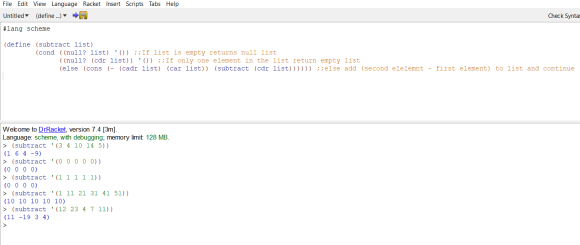Question
In: Computer Science
IN SCHEME Write a function subtract which takes a list of numbers as a parameter and...
IN SCHEME
Write a function subtract which takes a list of numbers as a parameter and returns a list of the differences. So, a list containing the second minus the first, third minus the second, etc.
(subtract '(3 4 10 14 5))
'(1 6 4 -9)
Solutions
Expert Solution
CODE:
(define (subtract list)
(cond ((null? list) '()) ;;If list is empty returns null list
((null? (cdr list)) '()) ;;If only one element in the list return
empty list
(else (cons (- (cadr list) (car list)) (subtract (cdr list))))))
;;else add (second elelemnt - first element) to list and
continue
Snapshot of Code and Output:

Related Solutions
Write a Scheme function that takes two integers and returns the list of all integer numbers...
Write a Scheme function that takes two integers and returns the
list of all integer numbers between these two integers
(inclusively) in increasing order. (numbers 10 20) (10 11 12 13 14
15 16 17 18 19 20)
Please explain every step.
Use Scheme Language Write a Scheme function that takes a list and returns a list identical...
Use Scheme Language
Write a Scheme function that takes a list and returns a list
identical to the parameter except the third element has been
deleted. For example, (deleteitem '(a b c d e)) returns ‘(a b d e)
; (deleteitem '(a b (c d) e)) returns ‘(a b e).
Write a Python function that takes a list of integers as a parameter and returns the...
Write a Python function that takes a list of integers as a
parameter and returns the sum of the elements in the list. Thank
you.
Write a Python function that takes a list of integers as a parameter and returns the...
Write a Python function that takes a list of integers as a
parameter and returns the sum of the elements in the list. Thank
you.
Write a Racket function that will take a list of numbers as a parameter and return...
Write a Racket function that will take a list of numbers as a
parameter and return true if they all are positive, and false
otherwise. You are NOT required to check the type of elements in
the list.
(please do on racket language)
Write a Racket function that will take a list of numbers as a parameter and return...
Write a Racket function that will take a list of numbers as a
parameter and return true if they all are
positive, and false otherwise. You are NOT
required to check the type of elements in the list.
Write a Scheme function that takes a positive integer n and returns the list of all...
Write a Scheme function that takes a positive integer n and
returns the list of all first n positive integers in decreasing
order:
(decreasing-numbers 10) (10 9 8 7 6 5 4 3 2 1)
Please explain every step
Write a Scheme function that takes a list of integers and returns all odd integers on...
Write a Scheme function that takes a list of integers and
returns all odd integers on the list in the original order:
(odd-numbers `(2 4 9 16 25 7)) (9 25 7)
Hint: 2 (remainder 13 5) 3
Please explain every step
Write a recursive function, max_in_list(my_list), which takes an non-empty list, my_list, of integers as a parameter....
Write a recursive function, max_in_list(my_list), which takes an
non-empty list, my_list, of integers as a parameter. This function
calculates and returns the largest value in the list. The base case
will probably deal with the scenario where the list has just one
value. The recursive case will probably call the function
recursively using the original list, but with one item removed.
Note: This function has to be recursive; you are not allowed to
use loops to solve this problem!
Test...
python Write a function pack_to_5(words) that takes a list of string objects as a parameter and...
python
Write a function pack_to_5(words) that takes a list of
string objects as a parameter and returns
a new list containing each string
in the title-case version. Any strings that have
less than 5 characters needs to
be expanded with the appropriate number of space characters to make
them exactly 5 characters long. For example,
consider the following list:
words = ['Right', 'SAID', 'jO']
The new list would be:
['Right', 'Said ', 'Jo ']
Since the second element only contains...
ADVERTISEMENT
ADVERTISEMENT
Latest Questions
- 1. The activation energy of a certain reaction is 41.5kJ/mol . At 20 ?C , the...
- Give TWO pieces of evidence that you've successfully made methyl salicylate. Remember when you cite TLC...
- Describe briefly the evolution of Craniata and Vertebrata.
- How many grams are in a 0.10 mol sample of ethyl alcohol?
- For this assignment you will write a program with multiple functions that will generate and save...
- How many grays is this?Part A A dose of 4.7 Sv of γ rays in a...
- how to operate a business?
ADVERTISEMENT
 venereology answered 1 year ago
venereology answered 1 year ago